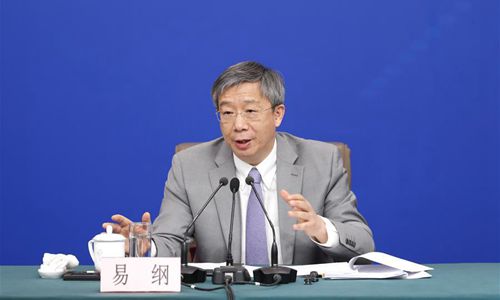China will make its monetary policy more flexible: PBC governor

Governor of the People's Bank of China Yi Gang attends a press conference on the financial reform and development for the second session of the 13th National People's Congress (NPC) in Beijing, capital of China, March 10, 2019. (Photo:Xinhua)
China will make its monetary policy more flexible to ensure sufficient liquidity and maintain the growth rates of the M2 broad money supply and social financing at significantly higher levels than in 2019, in line with this year's Government Work Report, said People's Bank of China Governor Yi Gang in a report published on Tuesday.
The central bank governor articulated the next-stage monetary policy strategy in an interview with Financial News, a publication under the PBC, amid social discussions on what kind of monetary policy China needs to reboot its economy post-coronavirus and during the ongoing two sessions.
Yi said supportive policies already in place had achieved "sizable" results in helping shore up market entities alongside the economic onslaught of COVID-19, particularly service providers and medium, small and micro-sized enterprises.
New bank lending in China from January to April totaled 8.8 trillion yuan ($1.23 trillion), 2 trillion yuan more than the same period last year.
The M2 broad money supply grew 11.1 percent year-on-year during the period while social financing grew 12 percent. "The significantly higher growth rates than in 2019 reflect strong counter-cyclical adjustments," Yi said.
China will use a variety of tools including reserve requirement ratio cuts, interest rate reductions and re-lending to enable the M2 money supply and aggregate financing to grow at notably higher rates than last year, read the Government Work Report submitted to the national legislature for deliberation on Friday.
Yi also said the central bank will steadfastly promote the further opening-up of China's financial sectors, ensuring the faithful and complete implementation of previously announced opening-up measures and at the same time strengthening financial risk management.
A number of foreign financial institutions, including US credit card giant Mastercard Inc and US-based ratings agency Fitch Ratings, have gained market access in China in recent months. Approval work is steadily progressing for investment management firm BlackRock Inc and Neuberger Berman, Yi said.